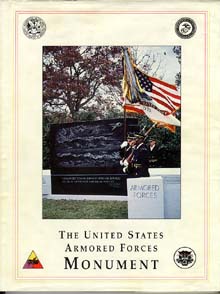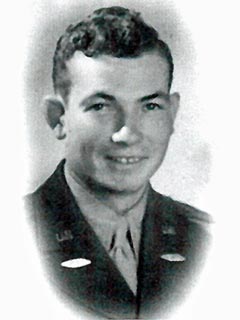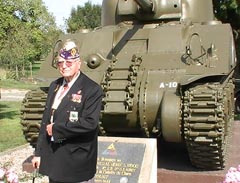|
Colonel James H. Leach -
"The sweetest man who ever lived,"
Marion Leach, 2007
Colonel James H. Leach was born in Houston, TX on April
7, 1922. He began US Army service when he joined the Texas National Guard
on June 19, 1938 at the age of 16.
When Gen. Patton began his summer dash across France in
1944, Jimmie Leach was commander of Company B, 37th Tank Battalion, 4th Armored
Division, serving under the legendary Lt. Col Creighton Abrams. He had
trained for four years as a tanker. He was uniquely prepared.
Jimmie was wounded five times in Europe, received the
Distinguished Service Cross for his heroism at Bigonville on Dec 24, 1944 and
three days later he captured and guarded the entry of the 37th into Bastogne in
relief of the 101st Airborne.
After WWII, Jimmie served in Korea on the island of
Cheju, moderating the angry wrath among island natives, off-island Koreans and
returning Koreans who had served in the hated Japanese Army.
He married Marion Heirs Floyd in 1951 and spent four years in
Germany guarding the Fulda Pass against the seemingly inevitable roll of Russian
tanks west into the Rhineland.
He assumed Armored Brigade Command as a Colonel in
the late 1960's, was assigned to Vietnam as senior advisor with the 5th ARVN division,
then, in 1969 assumed command of the 11th Armored Cavalry, replacing George
Patton IV. His aggressive leadership of the 11th is still remembered with
awesome respect by his subordinates and his peers. For the second time, in
his second war he heard the report that, "Jimmie Leach is the bravest man I ever
knew."
Jimmie Leach led the Army's Armor Branch with skill and
compassion in the early 1970's, managing the portfolios of some 6000 Army officers.
Gen Fred Franks and the current Secretary of the Department of Veterans
Affairs, Gen Eric Shinseki, report that Jimmie was responsible for their very
careers as he fought to keep these future General Officers in the Army although
each had lost a limb to wounds in Vietnam.
His defense of one young officer earned him the enmity
of Gen William Westmoreland and he was passed over for promotion as General
Officer. His son describes the scene at his home, with great friend, Gen
Creighton Abrams on hand offering support, but not interfering with this final
decision, as a wake.
Jimmie Leach retired from the Army and worked for
Teledyne for 13 years from 1972-1985. He kept his service to the Army
paramount and carried out the legislative and financial work leading to the
United States Armored Forces Monument near Arlington National Cemetery.

Jimmie Leach now lives in South Carolina where, over
the last twenty-plus years he has supported the causes of soldiers and
soldiering with unflagging zeal. He has visited the battlefields of France
and the Ardennes more than ten times, placing monuments and memorials to the men
who came there with him - and never came home. He has made peace with his
enemies in Germany - and Vietnam and traveled through both South and North
Vietnam to relook at the places and events there.
Jimmie works hard still to effect the expansion of the
Beaufort National Cemetery in Beaufort, SC, a cemetery established under
President Lincoln whose growth is threatened by neighborhood encroachment.
In 2006, Jimmie Leach spoke at the James H Leach
ReadinessCenter, a new SC National Guard facility built with funds wrested
from Congress through Jimmie's unremitting pressure on the late Sen. Strom
Thurmond. He reminded the local Guardsmen, who were on their way to
Afghanistan, that they continued a proud National Guard tradition of more than
two centuries, to which he had been attached for nearly 70 years. And his
message was clear: soldiers must train for war and never become complacent
with the present situation.
Jimmie Leach and I have spent hundreds of hours
recording his story. In September 2007 I was with him in the Galt Hotel in
Louisville when a middle aged man approached me and said, "Is that Col. Leach?"
I said yes and he said to Jimmie, "I want to thank you for saving my life in
Vietnam."
His story will unfold in time across this special
place.
Col. James H Leach died at 87 on Dec. 17, 2009.
He was driving his car near his home in South Carolina when he suffered a heart
attack. He was with us for 32031 days. Very few of them were wasted.
jimmieleach.us.
Matt Hermes
Copyright 2010 Matthew E Hermes
|
3.
Texas
National Guard (An excerpt from
Tanker Jimmie Leach. In this brief segment Jimmie Leach describes
his boyhood enlistment in the Texas National Guard and the efforts to conceal
his Guard membership from his father.)
J immie
Leach was a thoughtful and alert student when he returned to Jefferson Davis
High School as a sophomore, a year behind his class, after missing the 1937-8
school year. Dr. Max Weiner his history teacher, who was a Jew, fostered
discussion of the European politics that had not yet developed into open
warfare. Hitler menaced Western Europe in his foreign affairs while at
home he encouraged practices that threatened the Jews and all others not meeting
the Aryan image. Jimmie Leach recounts he and his classmates were aware of
the “Night of Broken Glass”, Kristallnacht, of Nov.9-10, 1938 wherein a coordinated
campaign of terror came down upon the physical symbols of Judaism in Germany:
200 synagogues attacked, schools and businesses trashed, more than 90 Jews
killed, 25,000 arrested. – the heart of the visible Jewish culture in ruins.
Weiner was appalled at these atrocities yet he remained a pacifist, a
non-interventionist, reflecting a fear of involvement of events so far away and
so menacing. Certainly the knowledge of these events was sketchy in Houston in
the fall of 1938, nevertheless Jimmie Leach drew an opposite conclusion than
Weiner from the facts at hand. America would intervene, Europe’s travail and
chaos would become ours. He had already acted.
He had
joined the Texas National Guard. Certainly this decision came with practical as
well as patriotic influences. The Guard, after all, was both a calling to
military service and an occupation that might continue Jimmie’s obligations to
provide support for his struggling family still in the primitive rental home.
And it might well be a career. The Guard decision was hardly an impetuous act.
Jimmie had talked to the Navy and Marine recruiters without success. Both
agreed that Jimmie being underage at 16 was not a problem – the enlistment of
military personnel below the age of 18 was against regulations but the
regulations were commonly ignored. Jimmie was rejected because of his parents.
The recruiters judged they were essentially his dependents and these services
were not about to be burdened with a 16 year old who would become responsible
for aging parents over his four-year enlistment. It is hard to understate the
developing role of Jimmie Leach as the critical center of this damaged family.
“My
fellow HS student Simon Monroe Purvis asked me to go to a National Guard meeting
held in the evening. He was a member of the 36th Tank Company of
the 36th Infantry Division, Texas National Guard which had one
company there in Houston,” Jimmie said. He did not join the unit immediately.
“I had a little debate, not much. Because there was an Air Guard unit there,
there was an Engineering Company there, there was the Houston Light Guard, a
famous Company, the 143rd Infantry. There were two batteries of
artillery and one horse cavalry troop. So Houston was loaded with National
Guard opportunities. Well I went back the 2nd or 3rd time
and decided to join and I lied about my age and went in.
“When I
joined the 36th Tank Company, we had the Mae West Light tank. That
was a machine-gun tank of 9 or 10 tons. It had two turrets. It had a couple of
knobs there you know. A .50 and a .30. One of them was a little larger than
the other – just like some ladies. But nonetheless that was the tank we had.
And the Cavalry was forbidden to have tanks by the budget act of 1920 and to get
by the rules they called their car a combat car. Not an armored car, a combat
car. The suspension and all was the same. The turret though was a single
rather than a two but it had a .50 and a .30. I decided
that if I went to war it would be better to be protected by an inch of steel in
a tank than by a flannel shirt,” Jimmie related. “I did not seek my family’s
permission.”
Jimmie
avoided guard basic training because he was a 2nd Lt in the Jr ROTC
having returned to his Junior year at Jefferson Davis. He knew the routines of
a soldier, the basic training, the school of a soldier, the discipline of a
soldier, the appearance of a soldier, the marching. “I gave all the orders. I
could handle the troops so they waived the basic so I immediately accepted as a
crew member on one of the two tanks. We had two tanks. I went in summer ’38 to
Camp Willis, San Antonio, Tx. Well, that first introduction to the 36th
Tank Company went something like this: We didn’t do much there, orientation,
lectures, drove the tanks around a little bit but there was no maneuvers as I
recall.
“First of
all we had World War I hand-me-down uniforms. Slip-over wool shirts, cavalry
britches and wrap leggings and hard-heeled leather-soled shoes that were
dangerous to climb on tanks with. We needed the old rubber-soled you got now
with the cleats so you don’t fall off. So we had to climb those damn things
with hard heels leather soles and you could fall pretty easily. But that was
the way things were.
“One
night at a formation, the first sergeant said, after he called all of us to
attention and took the roll, ‘Private Leach, front and center!’ I stepped back,
walked down the line and reported to the First Sergeant. He said ‘Stand to,
Leach’. And he did an about face and said to Capt. Bull Johnson (who was the
Athletic Director at the University of Houston) and our Company Commander of
the 36th Tank Company, he said, Captain, Private Leach is present.
Captain Johnson said, ‘Take your post, Sergeant.’ So he did. Johnson then
said to Leach, ‘About face.’ And then he looks upon the Company and I was
looking upon the Company and he said, ‘ I want you birds to look at the finest
looking soldier in this whole damn Company. And as of tonight I’m promoting him
to PFC and making him my striker and he’s our guide-on bearer from now on.
Leach take your post.”
“And
then came the Federal inspection. And he told us that for the Federal
inspection we all better be 18 years old so we’d better find out when we were
supposed to be born so we were 18 years old. So I had made a fib you see, and
the Guard accepted fibs in those days because the Guard needed people like me
and I showed some promise.
“Well,
would you believe it, I missed that federal inspection and Capt. Johnson called
me personally and said, I’m going to grab you by the butt and drag you to the
next inspection, 100 miles away in Caldwell, Texas, at this date and this time
and you better be there this time, do you understand. ‘Yes sir I do.’ And I
made the meeting, and he got off the hook for verifying two guys that didn’t
make the Federal inspection. Well, that was almost my ending. I thought I
would be a PFC for the rest of my life.
Both
Jimmie and his mother knew that David Leach harbored a strong and irreversible
disdain for the Guard, despising Guard units for their roles in breaking union
strikes across the country. It was a pattern; unions would mount worthy
campaigns for organizational integrity, improved working conditions, improved
wages and the right to strike. They would strike and time and again the Guard
became the government’s tool for breaking strikes and often the heads of the
union workers. Across the nation, the Guard had been called out 75 times to
intervene in strikes since Franklin D. Roosevelt’s inauguration in 1933. And
few Union members would forget the image of women and children suffocated In
the 1914 massacre when Colorado National Guard soldiers had participated in the
deaths of 20 striking miners and their families, including 14 children, on the
open prairie at Ludlow Colorado, near Pueblo.
‘“My
father refused to let me join the National Guard. He considered the Guard,
‘scab, turd, sons of bitches.’ My daddy was an avid union man. He was a
carpenter. As was my grandfather. Poppa said to me, no to the National Guard.
He already said OK to the Marines and Navy but they turned me down because I was
a potential dependency prospect with no future and if an enlistment of four
years they might become dependents and they couldn’t afford to support
dependents for lesser ranks like me. But daddy didn’t know I was in the
National Guard two years unbeknownst to him. He went to bed with the chickens
so he could get up and go to work early and come back and he went to bed with
them.
“And I
was like the Hitler youth. Mother made up my uniforms. Hid them. I hopped
into them, skedaddled out of the house, went to my drill, checked the house out
when I got back, got out of my uniform, hid the uniforms and you know I did that
for two years. But you know you have to go to summer camps. I did it. And
Momma would say to him, ‘Well you won’t hear from Jimmie for a couple of weeks.
He’s up in the country visiting friends.’ So she covered for me for two years.
“When I
made Corporal, though, I walked to the foot of his bed and said, ‘Corporal Leach
reporting, sir.’ And he said, ‘What the hell was that!’ I said, dad I’ve been
in the National Guard for two years. And I’m a Corporal and that’s a good rank
and off I went and that’s the beginning of an illustrious (or not so illustrious
career) as you will."
Eventually, Jimmie, resplendent in his full Guard uniform, wearing his
Corporal’s stripes, stood at attention before his father who was resting in the
bed in the dim room of the rental home. “Corporal Leach reporting for duty,” he
said. Jimmie Leach had been, de facto, the man of this house for some time. In
his new, pressed uniform, his shined new shoes, his trimmed hair and erect
posture, and his announcement in that small worn space that he was now Corporal
Leach of the Texas National Guard, he was laying claim to full responsibility
for his parents and for their welfare. David Watts Leach, Jr. did not protest.
Jimmie Leach had assumed his first command.
In the
summer of 1939, Jimmie Leach went to 36th Infantry Guard summer
training camp, Camp Hulen, in Palacios, Texas on Turtle and Tres Palacios Bays.
Palacious was a big, active, energetic field training site and Texan through and
through. The Guardsmen arrived by train and Jimmie Leach saw more than two
thousand tent sites, a long curved beach and an 825 ft. bathing pier and a dance
hall where notables of stage and screen might be entertaining the young
Guardsmen. There were real tanks at Palacious and the tankers practiced with
the 50cal and light 30cal machine guns. At the end of the summer camp, Jimmie
Leach wore the badge of a qualified tank gunner.
(An excerpt of a work in progress)
3/4/09
Questions or comments: Contact Matt
Hermes
|


![]()
